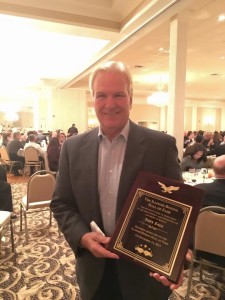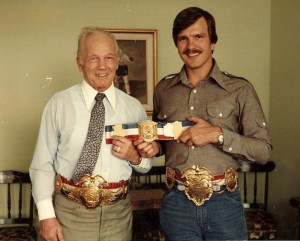Ted Zale: Nephew of Former Middleweight Champion Tony Zale Talks About His Uncle’s Amazing Boxing Career & More
 Exclusive Interview by Ian “The Boxing Historian” Murphy
Exclusive Interview by Ian “The Boxing Historian” Murphy
“Tony Zale was born with his drive and gameness. He was a fighter from the very beginning when a group of kids known as “The Dawg Town Gang” picked on him as a kid. He fought the lot of them. It truly was part of his God-given nature.”- Ted Zale
Sometimes the apple truly doesn’t fall far from the tree. Ted (Thad) Zale, nephew of legendary two-time World Middleweight Champion Tony “Man of Steel” Zale, learned more from his uncle than just how to throw a nasty combo in the ring. Ted’s dad Joseph passed away when he was very young, and his Uncle Tony became more of a father figure than just his father’s brother. Tony led by example, both via his dedication and discipline in the ring and leading a clean and exemplary life outside it. Ted was so inspired and affected by his Uncle Tony that he decided to write his story down, and let the world know that there was more to the boxing legend’s life than his ring exploits. With the help of noted boxing historian (a real one!) Clay Moyle, Ted finally was able to tell Tony’s story, appropriately titled Man of Steel. As a special treat addition to the upcoming review on that book, Ted agreed to answer a few questions for us.
IM: Tony Zale was known as a guy who never backed down and always fought his heart out. He never “phoned it in”. Where do you think Tony got his legendary resolve and dedication from?
Tony Zale was born with his drive and gameness. He was a fighter from the very first time when a group of kids known as “The Dawg Town Gang” picked on him as a kid. It truly was part of his God-given nature.
IM: Your uncle was known for his exceptional body attack. You really don’t see that level of body punching anymore, or even among his peers for that matter. Did he design that body attack, or did he learn it from a mentor?
Tony’s first organized fight was at the age of fifteen in Chicago. Another amateur fighter, more experienced than he, hit him in the solar plexus area. He never forgot how it felt to get hit so hard that you could not get your breath back. A taste of the meal he ate that night stayed with him. He lost that first match, but realized that he could temporarily immobilize someone if he learned how to hit to the body. All through his amateur career and his pro career he worked on maximizing his body attack strategy. He and his trainers knew if he could hit it right, the rest was academic. It was “body attack” by design, even if he took a couple of punches himself.
IM: I read that you boxed competitively. Tell us a little about your boxing experience. Were you adept at using your Uncle’s patented combo?
I did a little amateur boxing as a light heavyweight back in the 1960s and 1970s. I had a record of 20-3, but never had the heart Tony did for really working the sport. He taught me a great deal  about myself and how to succeed in life. He always stressed, “first, obey the Good Lord, second, obey your parents, and third get an education.” When speaking of my education, he would kid me and say that someday maybe I would write a book. I never imagined I would, but I did and it is his story that I penned.
about myself and how to succeed in life. He always stressed, “first, obey the Good Lord, second, obey your parents, and third get an education.” When speaking of my education, he would kid me and say that someday maybe I would write a book. I never imagined I would, but I did and it is his story that I penned.
He did teach me to slip a left and move in with that right to the body followed by a left hook. That still is the most devastating combination I know of.
IM: All the greats had certain things that made their training unique. Rocky Marciano had the 300lb Heavy Bag and punching underwater for example. George Foreman did a lot of wood chopping. Did your Uncle Tony have any unusual training habits that he shared with you?
Tony loved running the dunes of Lake Michigan’s waterfront and was always fond of chopping wood. As with everything he did in his career, he often worked too hard and over-trained. It was not unlike him to work out a full regimen at Trafton’s Gym in Chicago and then take the South Shore train home from Chicago to nearby Gary, Indiana. Once home, he would work fifteen rounds on the heavy bag out in the family barn. Then he’d work the speed bag for another fifteen rounds. There is no doubt that early in his career he left his “best work” in training camp. He always thought, “If I train more, I’ll get better quicker.” It wasn’t until he met Sam Pian and Art Winch that his training regimen changed and he allowed his body to re-build to a peak.
IM: In Man of Steel, you mentioned that Tony still did his roadwork into his late 70s, but did he have a unique diet to stay in such great shape for his whole life?
Tony knew that if he wanted to stay young and sharp, he had to continue to train and use the discipline he learned throughout his life as a fighter. It was not uncommon for him to work out three days a week on the heavy bag for five or six rounds, jump rope and work the speed bags. He did this through his later years in moderation rather than excess.
Also, in his seventies, he began to have an occasional glass of red wine to relax on weekends. Also, he kept up with the spinach and parsley drink regimen he had used in his career inside the ring that he would boil up on the stove. I had the opportunity, if you will, to watch him prepare it once and I can attest that this drink (although it had the nutrients that he used for so many years to keep healthy), unfortunately, for any of us who got a whiff of it, smelled to high heaven. He let it cool in the refrigerator in a Ball canning jar. He would pour a glass of it and drink it. He always felt it took care of his iron deficiency. It probably did.
IM: Do you have any thoughts about boxing today?
Yes, I don’t particularly like it, and I know my uncle would take exception to the proliferation of different sanctioning bodies and the lack of a unified championship. To him, “World Champion” meant just that. You take on everyone in your weight class and you become the one champion in that weight class. It’s that simple.
IM: Favorite fighters?
I do follow the welterweight, middleweight and light-heavyweight divisions.
IM: In closing, is there anything else you’d like to talk about?
It is awesome to have boxing getting TV time again on Friday and Saturday nights for this generation of boxing fans. My only wish for boxing though is that we see the return of the six championship belts that were stolen from the International Boxing Hall of Fame in Canastota, NY, on November 5, 2015. Two belts were won by my uncle and four were won by Carmen Basilio. The Zale and Basilio families ask all in boxing to be on the look-out for them and contact us directly, if they have any information. Please email at ChampTonyZale@aol.com if you have any ideas or leads. There is a $15,000 reward offered for the safe return of all six belts. Many thanks to Gomez and Lisa at TK99 radio station in Syracuse and Mauricio Sulaiman, President of the WBC for their contributions. The intrinsic value of these belts is minimal. But the value to the families of these champions is priceless. The boxing fans and the world wide visitors to the IBHOF want them back as well.
[si-contact-form form=’2′]

